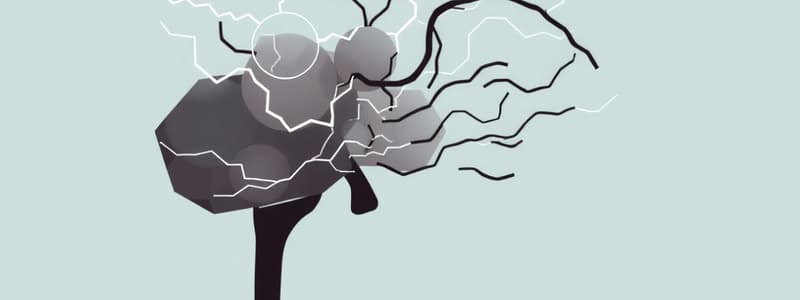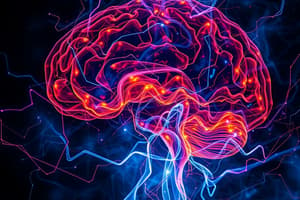Podcast
Questions and Answers
What is the primary focus of the psychodynamic perspective regarding behavior?
What is the primary focus of the psychodynamic perspective regarding behavior?
- Behavior is solely dictated by conscious thoughts.
- Behavior is primarily a product of genetic predispositions.
- Behavior is completely influenced by environmental factors.
- Behavior results from interplaying unconscious psychological forces. (correct)
Which aspect of Freud's levels of mind contains thoughts and feelings not currently in awareness but can be accessed if needed?
Which aspect of Freud's levels of mind contains thoughts and feelings not currently in awareness but can be accessed if needed?
- Preconscious/Subconscious mind (correct)
- Unconscious mind
- Superconscious mind
- Conscious mind
According to Freud, which component of personality operates on the pleasure principle?
According to Freud, which component of personality operates on the pleasure principle?
- Ego
- Id (correct)
- Superego
- Alter Ego
What therapeutic technique involves sharing thoughts freely without censorship?
What therapeutic technique involves sharing thoughts freely without censorship?
In psychodynamic theory, symptoms of abnormal behavior are primarily the result of what?
In psychodynamic theory, symptoms of abnormal behavior are primarily the result of what?
Which component of personality acts as the 'executive' and mediates the demands of the Id and Superego?
Which component of personality acts as the 'executive' and mediates the demands of the Id and Superego?
What does dream interpretation aim to uncover in a psychodynamic context?
What does dream interpretation aim to uncover in a psychodynamic context?
Which part of the mind contains unacceptable feelings and urges according to Freud?
Which part of the mind contains unacceptable feelings and urges according to Freud?
What is the main function of regression as a defense mechanism?
What is the main function of regression as a defense mechanism?
Which defense mechanism involves attributing one’s own unacceptable desires to others?
Which defense mechanism involves attributing one’s own unacceptable desires to others?
How does displacement function as a defense mechanism?
How does displacement function as a defense mechanism?
According to Freud, what is essential for a healthy personality?
According to Freud, what is essential for a healthy personality?
What is the primary goal of psychodynamic therapies?
What is the primary goal of psychodynamic therapies?
What is a characteristic feature of dream interpretation in psychodynamic therapy?
What is a characteristic feature of dream interpretation in psychodynamic therapy?
Which of the following best represents reaction formation as a defense mechanism?
Which of the following best represents reaction formation as a defense mechanism?
Which of the following is likely indicative of abnormal functioning according to Freud?
Which of the following is likely indicative of abnormal functioning according to Freud?
What is the primary goal of free association in psychodynamic therapy?
What is the primary goal of free association in psychodynamic therapy?
How does resistance manifest in therapy according to Freud's theory?
How does resistance manifest in therapy according to Freud's theory?
Which statement best describes transference in psychodynamic therapy?
Which statement best describes transference in psychodynamic therapy?
What are manifest and latent content in dream interpretation?
What are manifest and latent content in dream interpretation?
What is the purpose of catharsis in psychodynamic therapy?
What is the purpose of catharsis in psychodynamic therapy?
According to behaviorists, what primarily determines an individual's behavior?
According to behaviorists, what primarily determines an individual's behavior?
Which of the following is NOT a key concept associated with Carl Jung's analytical psychology?
Which of the following is NOT a key concept associated with Carl Jung's analytical psychology?
What is the foundational concept of Alfred Adler's individual psychology?
What is the foundational concept of Alfred Adler's individual psychology?
Flashcards
Regression
Regression
A defense mechanism where a person retreats to an earlier developmental stage to cope with stress.
Reaction Formation
Reaction Formation
An unconscious defense mechanism where unacceptable impulses are replaced with their opposite.
Projection
Projection
Attributing one's own unacceptable impulses, desires or thoughts to another person.
Rationalization
Rationalization
Signup and view all the flashcards
Displacement
Displacement
Signup and view all the flashcards
Healthy Personality (Freud)
Healthy Personality (Freud)
Signup and view all the flashcards
Psychodynamic Therapy
Psychodynamic Therapy
Signup and view all the flashcards
Compromise (id, ego, superego)
Compromise (id, ego, superego)
Signup and view all the flashcards
Free Association
Free Association
Signup and view all the flashcards
Resistance (psychoanalysis)
Resistance (psychoanalysis)
Signup and view all the flashcards
Transference
Transference
Signup and view all the flashcards
Dream Interpretation (psychoanalysis)
Dream Interpretation (psychoanalysis)
Signup and view all the flashcards
Catharsis (psychoanalysis)
Catharsis (psychoanalysis)
Signup and view all the flashcards
Behavioral Perspective
Behavioral Perspective
Signup and view all the flashcards
Inferiority Complex (Adler)
Inferiority Complex (Adler)
Signup and view all the flashcards
Carl Jung
Carl Jung
Signup and view all the flashcards
Psychodynamic Perspective
Psychodynamic Perspective
Signup and view all the flashcards
Conscious Mind
Conscious Mind
Signup and view all the flashcards
Preconscious/Subconscious Mind
Preconscious/Subconscious Mind
Signup and view all the flashcards
Unconscious Mind
Unconscious Mind
Signup and view all the flashcards
Id
Id
Signup and view all the flashcards
Ego
Ego
Signup and view all the flashcards
Superego
Superego
Signup and view all the flashcards
Psychodynamic model
Psychodynamic model
Signup and view all the flashcards
Study Notes
Psychodynamic Perspective
- Psychodynamic model is the oldest and most famous modern psychological model
- Behavior, whether normal or abnormal, is determined by underlying psychological forces
- These internal forces are dynamic (interacting)
- Abnormal symptoms result from conflicts between these forces
- Sigmund Freud (1856-1939) founded psychodynamic theory and psychoanalytic therapy
Freud's Three Levels of Mind
- Conscious Mind: Thoughts, memories, feelings, and wishes currently in awareness
- Preconscious/Subconscious Mind: Thoughts, memories, feelings, and wishes that can be brought to consciousness
- Unconscious Mind: Feelings, thoughts, urges, and memories outside conscious awareness, often unacceptable or unpleasant (e.g., pain, anxiety, sexual urges).
Structure of Personality
- Id: Produces instinctual needs, drives, and impulses; operates on the pleasure principle (demanding gratification)
- Ego: Employs reason and operates on the reality principle; acts as an executive to mediate demands of the id and superego
- Superego: Represents values and ideals; provides standards for judgement and future aspirations
- Conflicts among the id, ego, and superego can lead to personality dysfunction
Development of Personality
- Psychosexual stages of development (infancy-maturity)
- New events challenge individuals at each stage, demanding adjustments in id, ego, and superego
- Fixation (getting stuck in a stage) can lead to future abnormal functioning
Psychosexual Stages
- Oral Stage (0-18 months): Pleasure centers on the mouth (sucking, biting, chewing)
- Anal Stage (18-36 months): Pleasure focuses on bowel and bladder elimination; coping with control demands
- Phallic Stage (3-6 years): Pleasure zone is genitals; coping with incestuous sexual feelings (Oedipus/Electra complexes)
- Latency Stage (6 to puberty): No further psychosexual development; sexual energy is dormant
- Genital Stage (Puberty onwards): Maturation of sexual interests
Defense Mechanisms
- Strategies developed by the ego to reduce anxiety arising from unacceptable impulses
- Repression: Pushing distressing thoughts/feelings out of awareness
- Regression: Reverting to an earlier developmental stage
- Reaction Formation: Replacing unacceptable impulses with opposite behaviors
- Projection: Attributing unacceptable impulses to others
- Rationalization: Creating logical-sounding explanations for behaviors
- Displacement: Redirecting unacceptable urges to a safer substitute target
Therapeutic Techniques of Psychoanalytic Therapy
- Psychodynamic therapies aim to uncover past traumas and inner conflict
- Free Association: Describing any thought that comes to mind
- Resistance: Behaviors that block or resist discussion of sensitive topics
- Transference: Redirecting of feelings from past relationships to the therapist
- Dream Interpretation: Analyzing dreams to gain insight into unconscious motivation
- Catharsis: Reliving past repressed feelings to resolve internal conflicts
Studying That Suits You
Use AI to generate personalized quizzes and flashcards to suit your learning preferences.




